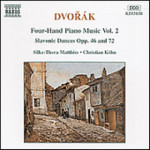
Dvorak: Four-Hand Piano Music, Vol. 2 (Slavonic Dances, Op. 46 & Op. 72)
 $25.00
Out of Stock
$25.00
Out of Stock6+ weeks add to cart
ANTONIN DVORAK
Dvorak: Four-Hand Piano Music, Vol. 2 (Slavonic Dances, Op. 46 & Op. 72)
Christian Kohn (piano) Silke-Thora Matthies (piano)
[ Naxos / CD ]
Release Date: Monday 20 August 2007
This item is currently out of stock. It may take 6 or more weeks to obtain from when you place your order as this is a specialist product.
"The brilliant piano duo of Matthies and K_hn are most persuasive performances radiating their own enjoyment...An excellent bargain"
- Penguin Guide
"I've never heard better...with sonics up to the best Naxos standards, there's no just reason to pay more"
- BBC Music Magazine"
"Matthies and Köhn have been playing duets together for ten years and they obviously have a good rapport....An attractive disc, cleanly and crisply recorded"
- Classic CD
"The brilliant piano duo of Matthies and K_hn are most persuasive performances radiating their own enjoyment...An excellent bargain"
- Penguin Guide
The dance was fundamental to Dvorak's life. It permeated his work, from opera and symphony to quartet and piano piece. In a biographical sketch (November 1942), Viktor Fischl evocatively reminds us how the corn fields and vineyards of Dvorak's birth-place were an especially "songful corner of the earth. The ploughman sang as he followed his plough, the smith at work beat out his music on the ringing anvil, songs were sung to the rhythm of the threshing, and on Sundays the lads gathered at the Dvorak's inn, where the village band played for their dancing, At the age of nine the innkeeper's little son, Antonin, joined the band with [his] small fiddle ..." On leaving the Prague Organ School in 1859 Dvorak joined the Karel Komzak Dance Band, providing music three times a week for the more fashionable Prague inns and restaurants. Subsequently, as principal violist for nine years of the orchestra of the new Provisional Theatre (opened 18th November 1862, specifically for the production of Czech language opera and drama), he played under Smetana in the first performances of The Brandenburgers of Bohemia and The Bartered Bride - fiercely patriotic music, the regional song and folk-dance inflexions of which he can scarcely have missed. At a time of dark Germanic oppression, the 1860s were a time of strong partisan feeling for the Czechs.
Tracks:
Slavonic Dances, Op. 46, B. 78
Slavonic Dances, Op. 72, B. 145



